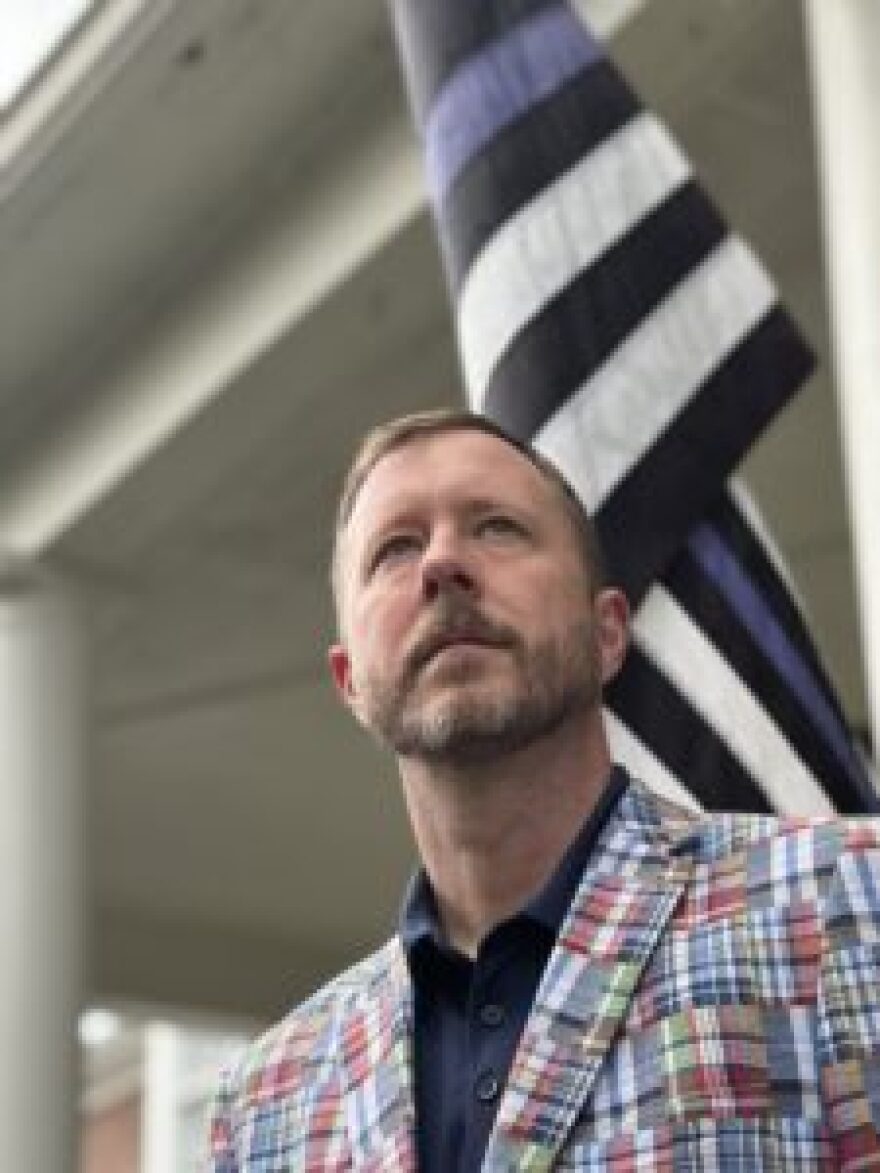Rob Stark Reishman is one of four candidates in the Republican primary for Louisville mayor. He works in the health care industry.
Learn about the rest of the candidates here.
This interview was edited for clarity and length.
Over the last two years, Louisville has seen a record-breaking spike in homicides and gun violence. What do you think of the Fischer administration’s programs to combat violent crime, like the Group Violence Intervention initiative, and what would you bring to the table?
I don't think that anybody would argue with me that the Fischer administration is absolutely asleep at the bike lane. He basically writes a paper and then says, “Well, it’s going to take a long time.” This is your third term, man. So, it just seems like it's all it's all talk.
It also feels like he never really supported the police. He always used them as a scapegoat. I think there has to be major support for the Louisville Metro Police Department and any other police officers that are around. They have to have the support of the mayor, and they haven't had that. I think we need to bring back some of the police officers that just recently retired. I think we need to bring back some of the ones that left because they weren't being supported. You have got to understand their frustration. These people are protecting us, and we give them no support. For the short term, we need to go back to proactive policing, hotspotting. There's several areas in almost any city that cause a majority of the crime issues. It seems to be a little bit bigger now, but with use of technology we can pinpoint it down to almost the street.
The other issue comes with once someone gets arrested, they're basically being let out on lower charges, or bailed out by a bail fund. I think we need to reopen the old Metro youth detention center. If someone’s child goes into detention, they have no support system. If they're getting busted, they don't even know where they're going to go, so their families can't even go see them. If we reopen the youth detention center we can offer all these programs to help them adjust, get a job, stable housing and other programs. If they have any mental illnesses, we can work with those, too. But shipping them off is not really the answer.
In 2020, Louisville Metro Council approved a new civilian review board and inspector general to provide more police oversight. What do you think of the police accountability reforms that are already in the works, and what would you propose to increase accountability and community trust?
It’s a double-edged sword. You have to have the support of the people that you're protecting. I think we need to get the communities involved, where they actually have a say. You have the community leaders, you have people that are actually involved in the process. Each community basically kind of has their own targeted thing, right, because every community is different. Like the Highlands aren't like St. Matthews. Shively is not like Graymoor-Devondale. So each community needs to get involved and work with police to address their unique problems. But a lot of this, like I said, stems from no support from the mayor. If the mayor doesn't support them, why would the people support them, right?
Every time I get a story from a police officer, it's usually, “We get a 911 call and we’ll go down there to help, and everybody scatters. They're like, ‘No, no police.’” It’s been an issue for a long time and it;s only been exacerbated by current events. Building trust with the community is obviously a huge thing, but there also needs to be some teaching to the community that these are law enforcement officers and this is what they do. There needs to be some education on both ends.
Many Louisvillians have taken note of the rapid increase in the number of residents living on the streets or in encampments throughout the city. What is your plan ensuring these folks have access to housing?
Obviously, building more affordable housing is one huge way, but I think just having affordable housing doesn't mean the homeless population is now all in a home, especially now with it being such a big problem. I’m sure most people don’t feel this way, but we need to get them out to an area where we can fence it in, put military tents, bunks, stuff like that. And not to keep them in, but to keep the bad out. One of the major issues is drugs, alcohol and mental illness, so those all need to be treated. If you're just allowing drugs and stuff to come in, well, then it just keeps the problem going. If you have an area like that and it’s policed, that it's a safe environment for everybody. Then you can bring in local organizations that will work with mental health issues, their physical health, making sure they're taking showers, that they have food and working on getting them employment.
I know that Mayor Fischer's going along with the single tents, but it's for like 50 people. If the economy is totally great, then that might be fine. But you just bought an almost $2 million property to house 50 people. (Note: The Hope Village’s opening is delayed.)
And it's not necessarily just people in Louisville that are homeless, it's people attracted to places that allow homeless populations and that will let them just be on the street doing whatever they want. So some of that comes from the current administration, as well.
In that same vein, working residents across the city, and particularly in the West End, are concerned about gentrification. As mayor, how would you balance new development and redevelopment with the needs of residents who want to stay in their homes and not be priced out of their neighborhoods?
It’s a very tough issue in any city, because one thing's not going to cure all. We desperately need more affordable housing, but we need more housing for all income levels. Some of the issues with affordable housing is the market. There’s not a ton of houses, even at the higher income level. When there's that demand, and people start buying their houses, there are no houses to buy. You have to build. Some of the zoning codes need to be modified to make it easier for new projects to get built, especially the ones that are 100% affordable housing. You could obviously give benefits for those. But zoning reforms will increase the supply of housing developments, lower costs for any potential owner.
We need to get some entrepreneurs in here and determine creative ways to build affordable homes. You can only build out for so long before you have to start building up. I think that you could look at some of the subdivisions and have them make choices, whether they want to build multi-family units on a single lot. I just think that we have to find new ways to do it. And I don't want to build a housing project that looks like it's run-down.
You need to give developers the options to do things, but they also need to make it look like it was part of the neighborhood, like it's not just this cheap box house that doesn't fit the neighborhood. If you make these things look like the neighborhoods that they're in, and the subdivisions that they're in, you can't tell the difference between one that’s affordable and one that's regular market rate. That's part of it, too. Local leaders should look at some of the vacant lots and we could maybe use some of those.
Working with the communities is another thing. Get them involved in what they want and what they don't want. You're not always gonna get a yes, but sometimes there can be a give and take. You need to go to each community and find out who wants what, who's willing to do what and then work with them. Other than just saying, “Nope, we're building that affordable housing right here and deal with it.”
In response to our audience survey, many people voiced concerns about Louisville’s dirty streets. They wrote about litter in public parks, in bike lanes and in neighborhoods. How would you address the need to literally clean up the streets?
Yeah, it’s dirty unless the Derby is in town. Then, they're like, “Hey, we got to clean up at least this portion because it’s where most people go.”
Any vacant properties, we need to find out what we can do with them, whether they're ours or somebody else's. If there's vacant property, people go there and they graffiti, they litter and it just keeps going.
As far as cleaning up, we need to go city-wide. If you get the community involved, most likely they will help. But until we can tackle things like public safety, it's going to be harder to get these other things done without the community involvement. If the city makes a push for it and we get the community involved, you know, we can go out and clean these places up. I think that that's what you do, we just need to get more community involvement, do it city by city or subdivision by subdivision.
The Intergovernmental Panel on Climate Change recently released a report saying it is “now or never” to avoid a climate catastrophe. What will you do to protect Louisville and its residents from the impacts of climate change, including the threat of increased flooding from severe weather events?
Technology, I believe, is one of the ways we can fix almost anything. There's road surfaces that will actually absorb water and pull it to other places and can hold them longer. We need to look into building little parks and more shaded areas. If you have some greenery, it helps the environment, because then it's a place that can help the city cool down and collect rain. It’s especially needed downtown. It would do a lot for people's mental health as well.
Then I think we should be giving developers incentives to build greener, especially when they're building affordable housing. That's why we need some entrepreneurs to come up with these ways to build better, to build greener. It starts with the city government as well. They just have to start going green on their buildings, and transforming them. Because you can't say, “Hey, everybody, you're gonna go green because we want to affect climate change, but we're not really doing anything about it for ourselves.” So, we have to look at all the government buildings to see what's going on with those. Green rooftops absorb water, they stop heat. So there's many things that we can look at that are feasible and don't necessarily cost a lot.







